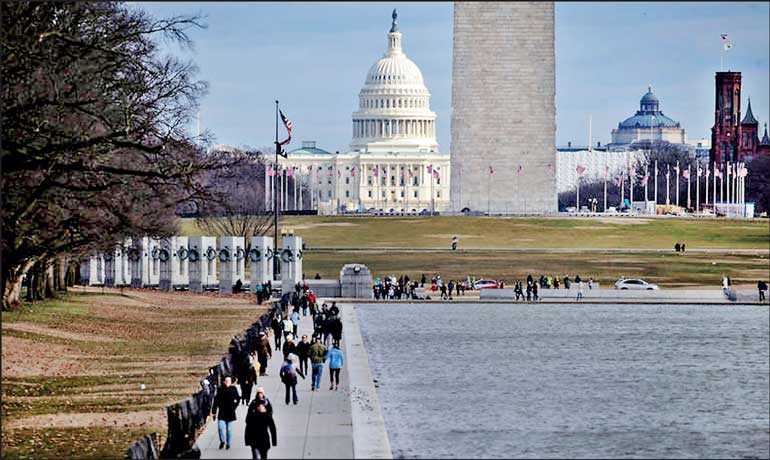Saturday Feb 21, 2026
Saturday Feb 21, 2026
Friday, 25 January 2019 00:00 - - {{hitsCtrl.values.hits}}

BENGALURU (Reuters): US economic growth will take a hit this quarter from the longest-ever government shutdown, keeping the Federal Reserve on the sidelines until at least its April 30-May 1 meeting, a Reuters poll of economists showed.
But the probability of a US recession in the next 12 months held steady from last month at 20%, according to the median forecast, while the chance of a recession in the next two years was also steady at a median 40%.
The latest Reuters poll of over 100 economists taken Jan 16-23 also showed a cut to the 2019 quarterly growth outlook, in line with a recent run of weaker US economic data pointing to rougher sledding for the economy this year than last year.
“With the economy possibly easing and inflation not stirring in a meaningful way, the case for additional tightening in monetary policy seems weak,” noted Michael Moran, chief economist at Daiwa Capital Markets.
The partial government shutdown affecting 800,000 federal workers has lasted more than a month and is expected to hurt the already-slowing economy. The Senate is preparing for a vote on Thursday to fund the government for three weeks.
Nearly 60% of about 50 economists who answered an additional question said the shutdown will have a significant impact on first quarter gross domestic product growth.
When asked how much of an impact the shutdown would have on US GDP for this quarter, the median was for a 0.3%age point trim. But forecasts ranged between 0.1 and 1.3%age points.
Analysts expected the US economy to grow at a 2.1% annualised pace this quarter, down from 2.3% forecast last month, followed by 2.3% in the second quarter and then slowing to 1.9% by the end of the year.
Growth forecasts were trimmed for each quarter this year.
“If the shutdown were to last for the entire quarter, it could subtract around a full percentage point from Q1 inflation-adjusted output growth. In a worst-case scenario, real GDP could indeed contract in Q1 if this Congressional impasse remains unresolved,” said Brett Ryan, senior US economist at Deutsche Bank.
“However, we have not made any changes to our current-quarter real GDP growth forecast...given the uncertainty around these estimates.”
A deep sell-off in financial markets last month drove several US stock indexes closer to bear market territory, and pushed expectations for the Fed to slow the pace of its rate hikes. Fed officials have also voiced growing concerns about the economy. Last week, New York Fed President John Williams called for “prudence, patience and good judgment” among policy makers.
The latest survey still predicted two rate hikes in 2019, in line with the December poll and the Fed’s own dot-plots. However, economists now expect the Fed to take rates higher in the second quarter instead of the first quarter, as predicted in the previous poll.
But nearly one-third of 105 economists predicted the US central bank would either hike rates only once or keep the fed funds rate unchanged at 2.25-2.50% in 2019. That was notably higher than the 11 of 101 respondents in the previous poll.
Traders of US short-term interest-rate futures expect no rate hikes in 2019.“We agree that the environment has shifted from that in December when the Fed issued its latest dot plot and hinted at two additional tightenings,” noted Daiwa’s Moran. “We have less confidence in our projection of two hikes, but we will hold to that view at this time.”
The core PCE price index, the Fed’s preferred inflation measure, was expected to reach the Fed’s target of 2% in the third quarter and then forecast to level out to average slightly above that at 2.1% in the final quarter.
It was 1.9% in November.
Over 80% of 52 economists who answered a separate question said a sell-off in financial markets and a sharper slowdown in the US economy pose the biggest challenges for the Fed in raising rates this year.
“Global weakness, tightening financial conditions, and quiescent inflation should lead the FOMC to pause their hiking cycle this year. The timing of rate increases will depend crucially on incoming data, but for now we expect the Fed to at least skip a Q1 hike,” noted James Sweeney, chief economist at Credit Suisse.